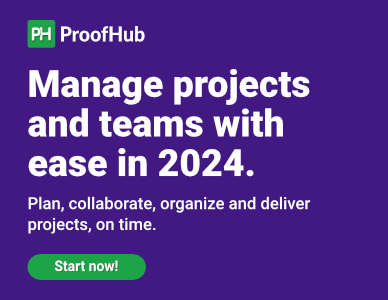Are you super pumped for an interview scheduled for the project manager position? Since you started working, you prepared yourself for those inevitable standard questions, “What’s your biggest weakness?” “Where do you see yourself in five years?” “Why do you want to be a part of our organization?” and so on. But, you should also know there will be plenty of questions related specifically to the position.
Are you smartly prepared to answer those questions? And do you know some of the major areas where you’ll be questioned about your relevant skills and experience? Well, that makes your heart start racing.
Examples of Project Management Interview Questions
This post is to help you to make your interview process productive. Gear yourself up with these thoughtful questions you may be asked. Let’s start:
Be successful in leading your team. Start using ProofHub for project management. Try ProofHub for Free
1. What are the three key challenges for your industry today and how do you tackle them?
The interviewer expects you to have knowledge about the project management industry. Start with the challenges and solutions as well. Some can be from your past experience as a project manager like increasing project complexity, continued skilled resource scarcity, increasing pace of change, lack of stakeholder management, meeting the customer’s requirements, and so on. This is critical for the success of any project manager as the challenges will always come along your way.
2. How do you give a start when a new project comes up?
You’ll be asked this to have a better understanding of your work strategy. Tell them how you set priorities for your work, you make schedules to coordinate the tasks, or use real-life examples to better explain how you set priorities. Make sure your strategy makes you look smart to handle projects and use your team’s strength for your advantage.
3. How do you delegate responsibilities?
Put forward relevant examples of how you’ve done it in the past whether it’s by conducting brief meetings, using project management tool, and so on, or your great ideas to do it in future. Of course, delegation is an important part of every project and knowing how to delegate effectively will help the team feel empowered.
4. Are you proactive? Is it important?
A project manager needs to manage any changes in time or cost to project progress as early as possible. Usually, the projects are unpredictable, so the manager needs to anticipate the problems as soon as possible. They should be proactive to make quick plans anytime. Be confident in showing that you can handle risks during the course of the project.
5. How do you make sure your team meets all the deadlines?
There is a solid deadline whenever a project comes up. The interviewer would want to know how you will manage your team effectively to make sure it meets all the deadlines. There is always a need for the project manager to communicate each person in the team how they have to hold their weight in completing the project. It is expected from a project manager to work together to finish a project within the designated deadline.
“Want to become a leader who gets things done?” Start using ProofHub.
6. Explain the difference between Agile and Scrum?
It is helpful to know the difference between Agile and Scrum for an Agile interview. Agile is a broad spectrum, the framework of approaches that encourage “just-in-time” production. It is used in project management while Scrum is just a form of the Agile that describes the process more concisely. Agile is a practice whereas scrum is a procedure to carry on this practice. Agile is the broader umbrella where Scrum falls under.
7. How do you plan an Agile project?
They want to know how you set estimates about the cost of something and about the deliverables. Will you be able to manage the ROI of the products being built by the team. You’ll have to maintain the scope, schedule, and budget in the Agile world.
8. Have you managed remote teams?
Everything can never be all under one roof. When you come across outsourced resource, using dynamic project management tools will help meet the necessary remote team management. Knowing how to how to get them on board, which tools to use, and how to manage people and resources is a crucial point for project managers.
9. What are the three main agile frameworks?
The three agile frameworks are:-
- Kanban
- Test-driven development
- Feature-driven development
10. What project management software do you prefer?
As a project manager, you’ve to have powerful tools for effective project management. A project manager needs tools to plan, collaborate, monitor, and report on the project. This question will show how updated you are with the process used to manage projects and your hands-on experience using the software.
11. How do you participate in team development?
Along with managing the project, team development is quite important for good project management. You should have a good knowledge of how you reach up to the expectations of your teams, express people management skills, and showcase your leadership.
12. How do you manage your project tasks on track?
When you’ve so much on your plate, you will rarely have one thing to manage at a time. Solid time management skills will make the difference how you successfully keep the project on track. Give examples of how you previously shared the workload and what steps you would take to get the project back on time.
Conclusion
These are just some of the expected interview questions that may come up for a project managerial position. Get yourself prepared with the answers so you can get into your dream. Once you get into the role of project manager, start using the best tools for project management to win every situation. ProofHub is a cloud-based project management software with online Gantt chart, collaborative platform, and task management features. Get your hands on such software. Lastly, don’t forget to show them that your personality is one that can handle project management well. Be sure to check out our blog as well for more project management tips.
All the best!
“Simplify the way you manage your projects and teams.” Start using ProofHub.

